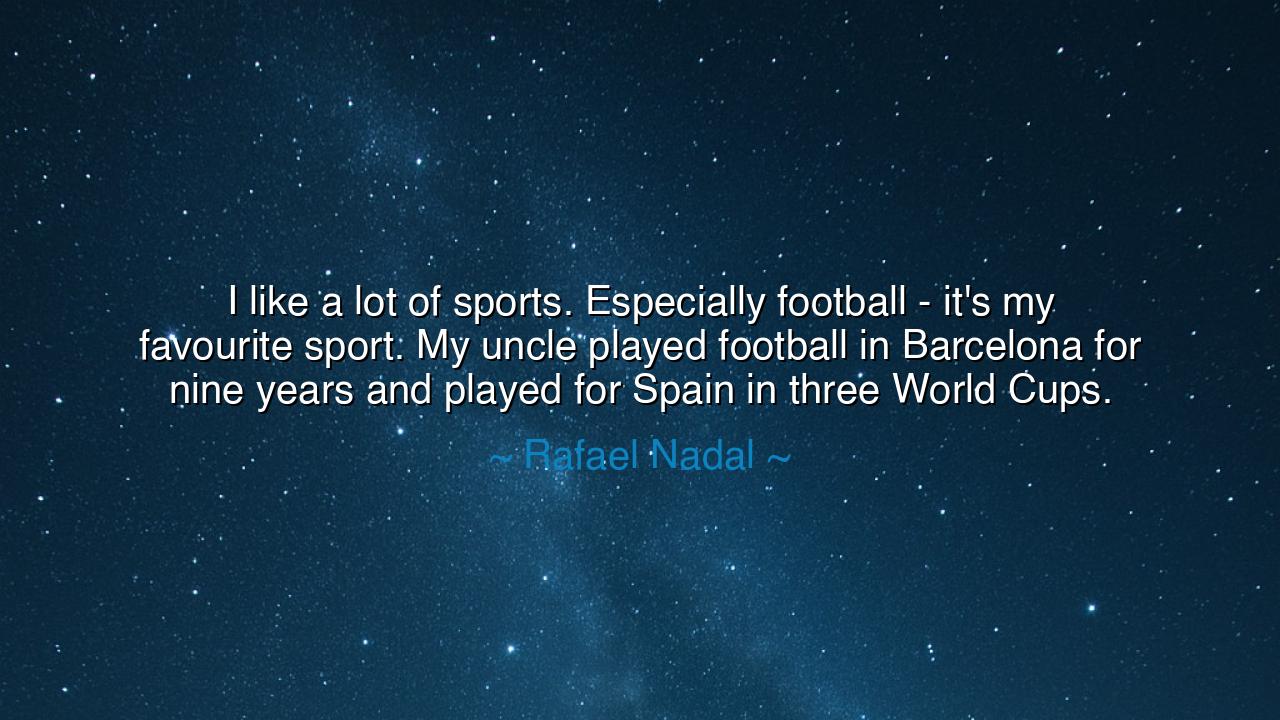
I like a lot of sports. Especially football - it's my favourite
I like a lot of sports. Especially football - it's my favourite sport. My uncle played football in Barcelona for nine years and played for Spain in three World Cups.






Hear, O children of memory and flame, the words of Rafael Nadal, the titan of the courts, who spoke thus: “I like a lot of sports. Especially football—it’s my favourite sport. My uncle played football in Barcelona for nine years and played for Spain in three World Cups.” These words, though simple, reveal the hidden currents that shape the destiny of men. For in them is the power of heritage, of family example, of love for sport itself as a sacred bond that passes from one generation to another.
Nadal, though famed for his mastery of the racket, confesses his heart’s kinship with football, the game that stirs nations and unites multitudes. Why? Because his own bloodline bore greatness upon the field. His uncle, Miguel Ángel Nadal, was not only a player but a warrior who fought for Barcelona and stood proud in three World Cups, carrying the banner of Spain before the eyes of the world. From such roots, Nadal’s own spirit was nourished—not by tennis alone, but by the wider flame of competition, discipline, and national pride.
This is no small thing, O listeners. For the ancients knew that a man’s greatness often springs from the examples before him. Consider the tale of Alexander of Macedon, whose father Philip built an empire and whose tutor Aristotle filled his mind with wisdom. Alexander did not arise from the void, but from the soil of greatness sown by others. So too with Nadal: his will was sharpened by the echoes of his uncle’s triumphs. Though he walked a different path—choosing tennis rather than football—his soul was lit by the same sacred fire of competition.
But note this also: though Nadal honors football as his favourite sport, he did not forsake the destiny set before him in tennis. This is the balance of wisdom: to admire many pursuits, to draw strength from them, yet to remain faithful to the path where one’s own gifts may shine brightest. He could not be both footballer and tennis champion, but the love of both gave him breadth of spirit, reminding him that sport itself is more than victory—it is tradition, culture, and joy shared among people.
From this we learn the greatness of family legacy. When a child sees his kin strive, labor, and triumph, he learns that greatness is not beyond reach. The uncle’s victories in Barcelona and the World Cups were like torches passed down, lighting the way for Rafael to craft his own story upon the clay and grass of the world’s courts. Such is the cycle of life: one generation inspires the next, and the flame is never extinguished.
Yet this tale also holds a warning: not all who are given great examples rise to meet them. Some falter beneath the weight of legacy, fearing comparison. Nadal shows us the higher way: to take inspiration, not burden; to transform admiration into action. He did not say, “I must be my uncle,” but rather, “I too will strive for greatness, though upon a different field.” Thus, he honored his family by being fully himself.
The lesson, O seekers of strength, is this: honor your roots, but do not be bound by them. Draw courage from the triumphs of your kin, your mentors, your heroes, yet carve your own path with steadfast will. Love many things, but commit yourself with discipline to the craft where destiny calls you. In this lies true greatness: not in imitation, but in carrying forward the spirit of those who came before, while blazing a new trail for those who will come after.
Therefore, let Nadal’s words echo within you: cherish the bonds of family, honor the spirit of sport, and never fear to walk your own path, even while holding the fire of your ancestors in your heart. In this way, your life too shall become a torch, passed to those who rise after you, a legacy of courage, devotion, and love.






AAdministratorAdministrator
Welcome, honored guests. Please leave a comment, we will respond soon